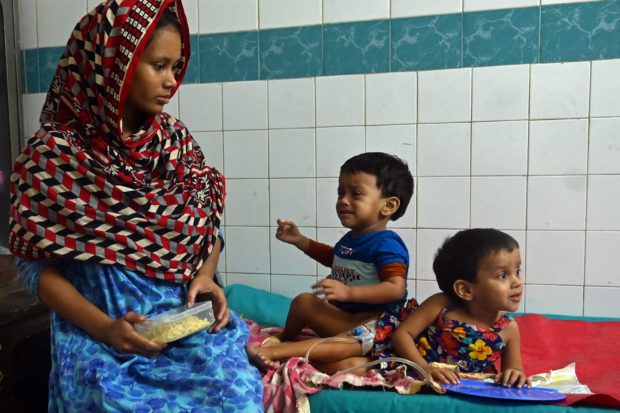Bangladesh surgeons to separate conjoined twin girls

The conjoined twins Lamisa (R) and Labiba sit beside their mother Monufa on the eve of their surgery at a hospital in Dhaka on December 12, 2021. (Photo by Munir uz Zaman / AFP)
DHAKA — Bangladeshi surgeons will on Monday separate conjoined twin toddlers in a marathon procedure long-delayed by the coronavirus pandemic.
The two-and-a-half year old girls, Labiba and Lamisa, were born joined at the back and share a spine, genitalia and part of their intestinal tract.
Doctors partially separated their rectums nine days after birth, but follow-up surgery was postponed last year after the country recorded its first Covid-19 cases.
“My babies cannot sit or properly lie down together,” said Monufa Begum, the 20-year-old mother of the twins.
“It is very difficult to keep them quiet. Both my husband and I have barely slept since their birth,” she told AFP.
Article continues after this advertisementA team of 35 doctors will oversee an expected 10-hour operation to separate the pair after two months of tests to determine whether the procedure was possible.
Article continues after this advertisementCaring for the twins has been an immense financial and emotional burden for the family, said 22-year-old father Lal Mia.
“I am very worried but simultaneously excited. It would be great to see my daughters walking and living separately,” he told AFP.
“But it is also very difficult for a parent to see their babies on the surgery table.”
The Dhaka Medical College Hospital is covering costs of the surgery and doctors there are hopeful about Monday’s outcome after safely separating two other sets of conjoined twins in 2017 and 2018.
“God willing, we will be successful,” Ashraful Haque, the hospital’s chief paediatric surgeon, told AFP.
Conjoined twins develop when an early embryo only partially separates, leaving babies physically connected after birth.
Many conjoined twins are stillborn or die shortly after birth, but advances in surgery and technology have improved survival rates.